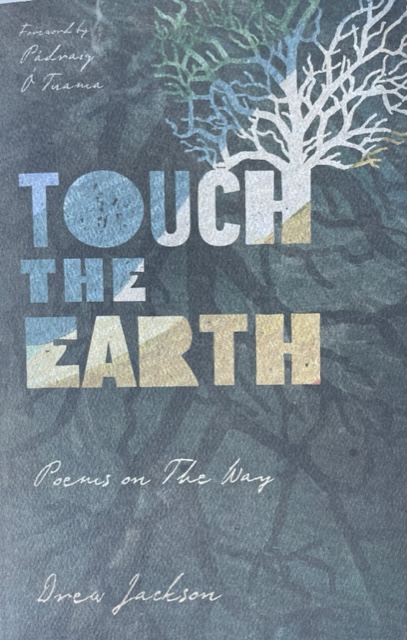Last week I attended the Inhabit Conference. It was a delight to reconnect to old friends and make new ones. One of the highlights for me was listening to Drew Jackson recite poems from his new book Touch the Earth . This delightful collection of poems is the second in a series reflecting on the Gospel of Luke. The first, God Speaks Through Wombs covered Luke 1-8, Touch the Earth picks up where God Speaks Through Wombs left off in Chapter Nine. This is not a poetic Biblical commentary, though it should be read with your Bible in hand. It would be better described as protest poetry or maybe even revelatory poetry as Drew’s poems inspire an often profound and refreshingly new reading of scripture.
At the conference Drew’s read The Kingdom of Trees. I reread it later with my Bible open at Luke 17:20,21 which tells us “the kingdom of God is in your midst” Wow! I love this – Trees and the kingdom of God. It is profound, as are many of the other poems in this book. I am using it now as a devotional.
The trees soon revealed startling secrets. I discovered that they are in a web of interdependence, linked by a system of underground channels, where they perceive and connect and relate with an ancient intricacy and wisdom.
To say that I am within the trees
is to say that I am among them.
The trees consider themselves
a collective, connected at the root.
Communicating through mycelium,
sharing generational wisdom.
They do not withhold,
there is not competition-
always and ever giving.
And we marvel at how the trees seem
to live forever-
the never-ending kingdom.
Like Drew I discovered the beauty and the joy of translating my thoughts and emotions into written prayers and poems, though mine are certainly not as inspiring and profound as his are. Like him I found that writing such prayers andpoems helps me to slow down, breathe deeply and take notice of the voice of God bubbling up from deep within me and from the world around me. Much to my surprise I find that poetry like this is a powerful force that can transform not only my own life but also the lives of others who read them and allow them to resonate in their hearts.
Drew’s poetry has that kind of transforming impact if we take the time to read each poem and the scripture it is aligned with together, and then reflect on them and what God would say to us through them.
Poetry like Drew’s often inspires us to respond, first with our own words and then often with action.
Poetry is not just about words. Drew’s poetry inspires our imaginations so that a thought or image resonates in our minds. It calls to us, perhaps out of the depths of our own pain, or through flashes of intense joy and awe inspiring wonder. The image it evokes grows and takes shape emerging into words that burst out of our mouths. We recite them aloud, sensing the vibrations not just in our ears but also in our hearts and minds. They pluck at our heartstrings and slowly we craft them into our own cascade of verses, sharing our own pain, recognizing our indifference to the suffering of others or bringing healing and refreshment in mind, soul and body.
The Bible is full of poetic images like this that pull at our heartstrings and beckon us to listen to the voice of God, healing and cleansing our spirits on the way. Yet sometimes we feel that these ancient books cannot fully express what is bubbling up within us. Spoken prayers and words of adoration and praise don’t seem to do it either. We need the language of modern poetry that enables us to interpret the pain and the joy of life in our own unique and expressive way.
There are a number of reasons why poetry is particularly suited to the expressing of our emotions and to the telling of hard truths about injustice. First, emotional undertones are hard to put into words. The metaphor and imagery that takes shape in a poem often helps us give voice to them. Drew is an expert at this. Second, the use of poetic rhythm taps into powerful nonverbal responses, in much the same way that music does. Even the abstract nature of poetry is a powerful tool that makes it easier to take a closer look at painful experiences which can be threatening to us if we try to approach them in a direct manner. This is part of the reason Drew’s poetry is so important. He expresses his protest at a world of abuse and injustice but in a way that draws us into community and trust.
We live in a world that is full of pain and heartache and all of us need tools that help us process this pain. You may not like to write poetry as Drew and I do but I am sure that God has given you some form of creative expression that carries the same power. Sit prayerful for a few minutes. What form of creative expression comes to mind as an avenue through which you express your emotions and process your pain? How could you use Drew’s poetry to process your pain or to help galvanize you into action?
NOTE: As an Amazon Associate I receive a small amount for purchases made through appropriate links. Thank you for supporting Godspace in this way.

